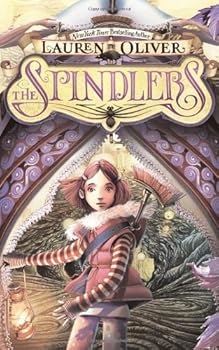
![]() The Spindlers by Lauren Oliver
The Spindlers by Lauren Oliver
I can’t say that Lauren Oliver’s The Spindlers is a particularly memorable middle-grade novel, but its combination of familiar plucky heroine and unusually plucky rat, echoes of The Borrowers, and a few moments of inspired originality made it a consistently enjoyable one.
When Liza’s younger brother Patrick begins acting strangely one morning (one clue is his lack of sticking his tongue out at Liza), she realizes his soul has been taken by the Spindlers, evil spidery creatures that can change size and that have heads at the end of each of their eight legs. Liza had been schooled in the Spindlers and other fantastical creatures by her former babysitter Anna, who unfortunately is off at college. This leaves Liza on her own to travel via a crawlspace in her basement into the “Below,” land of the Spindlers.
But before she can get to the Spindler nests to rescue her brother’s soul, Liza must first apologize to the rat she landed on at her entry into the Below — a wig-wearing, make-up covered rat named Mirabella who also has a few missing items from Liza’s house “Above,” including her father’s reading glasses. Mirabella becomes Liza’s guide through the land of Below as they travel to the Spindlers’ nests via the Troglod Market, the dungeons of the Nid, The Live Forest, and The River of Knowledge. She also meets the Nocturni, the beautiful creatures that bring dreams to those Above (one Nocturna per person) and must pass through several horrifying trials.
The Spindlers is a lean, sprightly novel that moves quickly but lacks the full richness of detail that would make it a truly standout book. A few scenes feel a bit perfunctory, with an added jot to try and distinguish them from overly familiar situations, such as the scary living trees or the riddle test. Other moments, however, rise much higher to the occasion, especially the Nocturni. The Spindlers have potential but it doesn’t feel like their frightfulness is fully mined.
Liza doesn’t stray too far from the usual young heroine mold, though she is sharply characterized and so feels less a character type than an actual young girl. Perhaps the best touch in this regard is her love of story and her recognition of the necessity for it in life, as when she thinks:
That was what her parents did not understand… Liza told herself stories as though she was weaving and knotting an endless rope. Then, no matter how dark or terrible the pit she found herself in, she could pull herself out, inch by inch and hand over hand, on the long rope of stories.
As is the case of all such stories, Liza returns from the fantasy world not quite the same person she was when she left; she knew, as she says, “many things she had not known yesterday.” If there weren’t quite enough “things I had not known yesterday” in The Spindlers to make it a top read, there were enough to make it a mostly enjoyable one. Moderately recommended for middle readers.



I might try this. I really liked the one Oliver book I read.
I have her book Liesl and Po which I’m planning to read with my daughter.